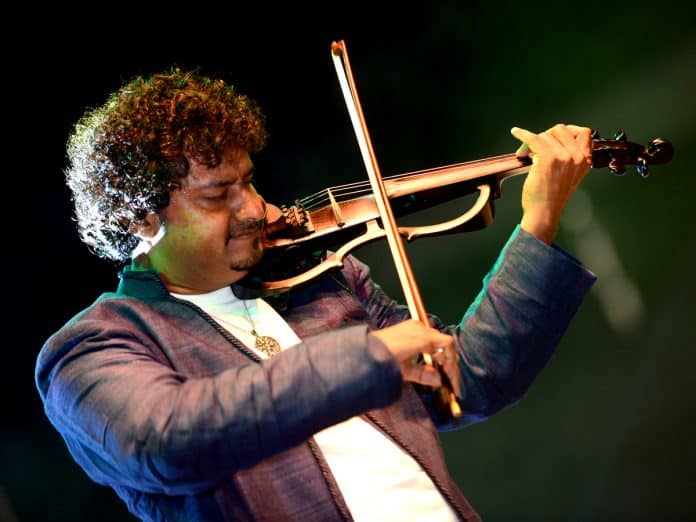“It is about time the music scene changed in India.”
India’s Grammy winning violinist Manoj George ditches his characteristic gentle, soft-spoken demeanour for a moment, and allows his passion to come forth. “There are umpteen independent musicians who lose ground when it comes to competing with the multimillion rupee film industry in India,” he laments. “Here in Australia, you listen to independent music on radio and television. How many Indian television or radio channels play independent music? How many Indians even buy an original music CD or pay to download their music?”
 Diligently latching on to his favourite bow and fiddle, Manoj sat down to have a chat with Indian Link, during his recent tour to Australia.
Diligently latching on to his favourite bow and fiddle, Manoj sat down to have a chat with Indian Link, during his recent tour to Australia.
Yet, he acknowledges, life has been kind to him as a musician. Fresh from a successful string of concerts in Sydney, Canberra, Wollongong, Townsville, Newcastle, Perth and Brisbane, he describes how his original compositions went down well with the audiences each time. “I’ve now played in 45 countries, with endless number of artists from all around the world. For someone who started my music career playing at the lobbies of Oberoi Hotels, this has been a dream run!”
The ‘dream run’ includes the album Winds of Samsara, which took the Grammy for Best New Age album in 2015.
“The recognition came home for arranging the string section for a track in the album titled Mountain Solitude and coordinating the choral harmony for a song titled Mahatma. The project brought together 120 musicians from five continents and showcased five languages. Ricky Kej, the Indo-American composer drew me into this album. By the way, the album has a major Australian connect too – the flautist and master composer Woulter Kellerman, one of its two creators, is Melbourne-based.”
It is about time the music scene changed in India. There are umpteen independent musicians who lose out when it comes to competing with the multimillion rupee film industry in India
In India, Manoj’s work with other new age musicians Raghu Dixit and Lucky Ali, and in his own band ManojGeorge4Strings, is slowly but surely bringing in a breath of fresh air. “The logic is simple. Every type of music is beautiful and we love all genres of music. You could call our style world fusion music – it’s a combination of ethnic, non-western and contemporary styles. On stage, I try to improvise a lot; when I see the audience enjoying a certain type of music, I provide them more of it.”
His particular brand of music has led to collaborations with some of India’s music heavyweights such as Dr L. Subrahmaniam, Hariharan, Shankar Mahadevan, Sivamani, Dr K.J.Yesudas and Mattannur Sankarankutty. For the scores of other talented independent musicians though, this ‘dream run’ remains exactly that, a dream. What does Manoj see as a resolution?
“It is a vicious cycle that feeds itself. Mainstream media supports the film music, as they provide what their audience wish to listen to. Audiences listen more to the film music, as that is the most accessible form of music. This cycle needs to be broken. Everyone can play a part here. The media can devote specific slots for playing independent music, which will slowly build up an audience. It will be great if the audience, for their part, can be more appreciative of the fact that independent musicians are putting in a lot of effort too.”
In a recent TEDx talk, he spoke of how he turned a childhood passion into a full-fledged career, interspersing his address with samples from Mozart as well as Arijit Singh to give an idea of the breadth of his craft. Whilst agreeing that YouTube promotes independent broadcasters, Manoj feels that a nudge in the right direction from the authorities will be a welcome change too. “How about instating awards for independent musicians? And while we’re at it, let’s attach some pomp and glamour to it, so that it does not go unnoticed!”
Who will bell the cat? Manoj George himself, to start with. He has already approached the authorities in his home state, Kerala, and is holding discussions with the cultural ministers to make this happen. “Once this materialises in one state, the word will gradually spread, and this will initiate a social change in the industry. I believe that only about 25% of our talent pool achieve fame by striking it big in the movie industry. The rest struggle to find their footing. My intent is to harvest this massive potential to liberate authentic Indian music out of the clasps of the indigenous movie industry and bring it onto the world stage.”
There’s no doubt that Manoj is willing to be the change that the current music scene in India needs.





